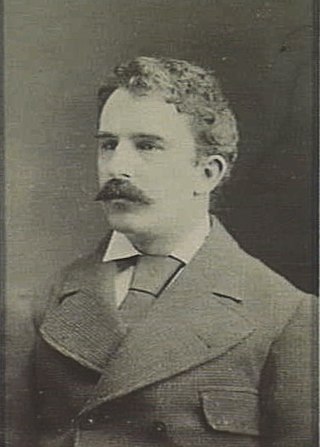Related Research Articles

William Joseph Lincoln was an Australian playwright, theatre manager, film director and screenwriter in the silent era. He produced, directed and/or wrote 23 films between 1911 and 1916.

Garnet Walch, was an Australian writer, dramatist, journalist and publisher. The youngest son of Major J. W. H. Walch, of H.M. 54th Regiment, he went on to become the most popular, and arguably the most successful, writer for the Australian stage during the 1870s and 1880s, While many of his works were localised and updated adaptations, it was his ability to tap into the public's mood and desires by expressing sentiments and making satirical allusions that made his works so popular. Walch wrote a wide array of genres and forms, including "serious" dramatic works, comedies, pantomimes, burlesques, melodrama, and comediettas.

Alfred Dampier was an English-born actor-manager and playwright, active in Australia.

The Romantic Story of Margaret Catchpole, generally referred to as Margaret Catchpole, is a 1911 Australian silent film directed by Raymond Longford and starring Lottie Lyell. It is based on the true story of Margaret Catchpole, an adventurer and convict.

Alfred Rolfe, real name Alfred Roker, was an Australian stage and film director and actor, best known for being the son-in-law of the celebrated actor-manager Alfred Dampier, with whom he appeared frequently on stage, and for his prolific output as a director during Australia's silent era, including Captain Midnight, the Bush King (1911), Captain Starlight, or Gentleman of the Road (1911) and The Hero of the Dardanelles (1915). Only one of his films as director survives today.
The MacMahon brothers were entrepreneurs in Australian show business. Chief among them were James MacMahon and Charles MacMahon, who together and separately toured a large number of stage shows. Their younger brothers, Joseph and William, were involved in many of those activities.
Robbery Under Arms is a 1907 Australian silent western/drama film based on the 1888 novel by Rolf Boldrewood about two brothers and their relationship with the bushranger Captain Starlight. It was the first film version of the novel and the third Australian feature ever made.

Captain Midnight, the Bush King is a 1911 Australian silent Western film about the fictitious bushranger Captain Midnight. It was the directorial debut of actor Alfred Rolfe. The film is based on the play of same name by W. J. Lincoln and Alfred Dampier. Captain Midnight, the Bush King is now considered lost.
Captain Starlight, or Gentleman of the Road is a 1911 Australian silent film about the bushranger Captain Starlight. It was based on Alfred Dampier's stage adaptation of the 1888 novel Robbery Under Arms. It is considered a lost film.
The Life of Rufus Dawes is a 1911 Australian silent film based on Alfred Dampier's stage adaptation of the 1874 novel For the Term of His Natural Life produced by Charles Cozens Spencer.

Dan Morgan is a 1911 Australian film from Charles Cozens Spencer about the bushranger Daniel Morgan. It was said to be starring "Alfred Rolfe and company". Rolfe directed three movies for Spencer, all starring himself and his wife Lily Dampier so there is a chance he may have directed this one and that it starred his wife. A prospectus for the Australian Photo Play Company said he directed it. It is considered a lost film.

Katherine Annabel Lily Dampier, known as Lily Dampier, was an Australian actress of stage and screen. She was the daughter of Alfred Dampier and married to Alfred Rolfe.
The Miner's Right is an 1891 play by Alfred Dampier and Garnet Walch based on a story by Rolf Boldrewood. It was highly successful and one of the most popular Australian plays of the 1890s.
The Power of Wealth is a 1900 play by W. J. Lincoln. It was based on the novel Vendetta by Marie Corelli.
Robbery Under Arms is a 1890 play by Alfred Dampier and Garnet Walch based on the novel of the same name by Rolf Boldrewood.
Under the Southern Cross, also known as Arnold's Luck or Under the Southern Cross is a 1885 stage play by Alfred Dampier. It was written at a time when Australian plays were relatively rare.
For the Term of His Natural Life is an 1886 Australian stage play adaptation of the novel For the Term of His Natural Life.
For Love and Life is a 1890 Australian play by Alfred Dampier and Garnet Walch about hypnotism, a topic then very fashionable in London.
This Great City is a 1891 Australian play by Alfred Dampier and Garnet Welch.
Help One Another is a 1892 Australian stage play by Alfred Dampier and Garnet Walch. It was produced starring Dampier. It was adapted from an Irish drama.
References
- ↑ "ALEXANDRA THEATRE". The Record . Melbourne: National Library of Australia. 27 June 1891. p. 2. Retrieved 7 September 2013.
- 1 2 Katherine Brisbane, Entertaining Australia: An Illustrated History p 118
- ↑ "Advertising". The Argus . Melbourne: National Library of Australia. 11 May 1891. p. 12. Retrieved 7 September 2013.